A Letter from Joseph Conrad in the Baptist Missionary Magazine
in The Baptist Missionary Magazine (Boston, MA, USA) Vol. 85, No. 2 (Feb 1905):  pp.52–91
pp.52–91
- First serialized as A Letter from Joseph Conrad in the Morning Post in The Morning Post (London, UK) (Oct 12, 1904)
- Collected as A Letter from Joseph Conrad on the Congo in The Collected Letters of Joseph Conrad (2007)
 View in Internet Archive BookReader (experimental).
View in Internet Archive BookReader (experimental). An edited version of Conrad's letter to the humanitarian campaigner Roger Casement of 21 December 1903 (CL 4:96-97):
'JOSEPH CONRAD, the well-known novelist, who has seen service on the upper Congo, and who knows what conditions are there from personal experience, describes the situation thus:
It is an extraordinary thing that the conscience of Europe which seventy years ago has put down the slave trade on humanitarian grounds tolerates the Congo State to day. It is as if the moral clock had been put back many hours. And yet nowadays, if I were to overwork my horse so as to destroy its happiness of physical well-being I should be hauled before a magistrate. It seems to me that the black man--say of Upoto--is deserving of as much humanitarian regard as any animal, since he has nerves, feels pain, can be made physically miserable. But as a matter of fact, his happiness and misery arc much more complex than the misery or happiness of animals, and deserving of greater regard. He shares with us the consciousness of the universe in which we live -- no small burden. Barbarism per se is no crime deserving of a heavy visitation, and the Belgians are worse than the seven plagues of Egypt ... What makes it more remarkable is this: The slave trade was an old established form of commercial activity; it was not the monopoly of one small country, established to the disadvantage of the rest of the civilised world in defiance of international treaties and in brazen disregard of humanitarian declarations. But the Congo State, created yesterday, is all that, and yet it exists. It is very mysterious. [...] The fact remains that in 1903, seventy years or so after the abolition of the slave trade (because it was cruel), there exists in Africa a Congo State, created by the act of European Powers, where ruthless, systematic cruelty towards the blacks is the basis of administration, and bad faith towards all the other states the basis of commercial policy.'
See Hunt Hawkins, 'Joseph Conrad, Roger Casement, and the Congo Reform Movement', Journal of Modern Literature 9/1 (1981-82): 65-80. Available to subscribing institutions via JSTOR. Click here.
'JOSEPH CONRAD, the well-known novelist, who has seen service on the upper Congo, and who knows what conditions are there from personal experience, describes the situation thus:
It is an extraordinary thing that the conscience of Europe which seventy years ago has put down the slave trade on humanitarian grounds tolerates the Congo State to day. It is as if the moral clock had been put back many hours. And yet nowadays, if I were to overwork my horse so as to destroy its happiness of physical well-being I should be hauled before a magistrate. It seems to me that the black man--say of Upoto--is deserving of as much humanitarian regard as any animal, since he has nerves, feels pain, can be made physically miserable. But as a matter of fact, his happiness and misery arc much more complex than the misery or happiness of animals, and deserving of greater regard. He shares with us the consciousness of the universe in which we live -- no small burden. Barbarism per se is no crime deserving of a heavy visitation, and the Belgians are worse than the seven plagues of Egypt ... What makes it more remarkable is this: The slave trade was an old established form of commercial activity; it was not the monopoly of one small country, established to the disadvantage of the rest of the civilised world in defiance of international treaties and in brazen disregard of humanitarian declarations. But the Congo State, created yesterday, is all that, and yet it exists. It is very mysterious. [...] The fact remains that in 1903, seventy years or so after the abolition of the slave trade (because it was cruel), there exists in Africa a Congo State, created by the act of European Powers, where ruthless, systematic cruelty towards the blacks is the basis of administration, and bad faith towards all the other states the basis of commercial policy.'
See Hunt Hawkins, 'Joseph Conrad, Roger Casement, and the Congo Reform Movement', Journal of Modern Literature 9/1 (1981-82): 65-80. Available to subscribing institutions via JSTOR. Click here.
